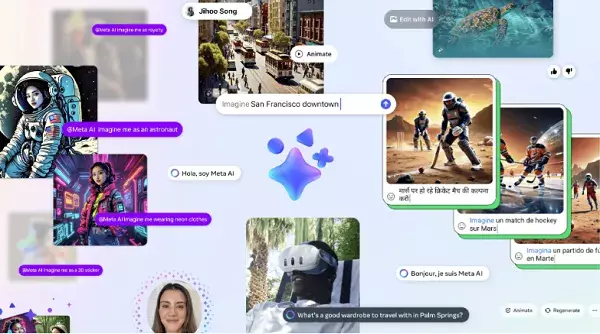In a move to further solidify its presence in the AI space, Meta has announced an expansion of its Meta AI chatbot to seven additional languages and regions. This will provide users in countries such as Argentina, Chile, and Mexico with access to Meta’s in-app chatbot in languages including French, German, and Spanish. While Meta CEO Mark Zuckerberg touts the bot as on track to becoming the most used AI assistant globally, it raises questions about whether this reflects true popularity or simply ubiquity due to Meta’s widespread user base.
Adding to the functionality of its chatbot, Meta now allows users to create AI-generated images of themselves directly from the chat stream. This feature, called “Imagine Me,” enables users to envision themselves as superheroes, rockstars, or athletes based on a prompt and a photo of themselves. While this feature may pique initial interest, similar to Snapchat’s “Dreams” functionality, the long-term appeal remains uncertain.
One of the primary concerns with Meta’s increasing integration of AI content is the potential dilution of the human element in social media interactions. By encouraging users to rely on AI-generated content, there is a risk that the authenticity and connective experience of social media may be compromised. While these functions may expand creative possibilities, it raises questions about whether prioritizing AI over human interaction aligns with the essence of social platforms.
Meta is rolling out a new option that allows users to select which AI model to use for various tasks within the app. This feature, while providing more advanced capabilities for technical queries, may not see widespread adoption due to its technical nature and the need to access AI model settings. Additionally, empowering users to choose the most powerful AI model may create disparities in user experiences based on their selection.
In a significant update, Meta is launching Meta AI in VR for selected users in North America. This integration aims to enhance the VR experience by enabling users to control their headsets hands-free, access real-time information, and interact with the environment using voice commands. While this development showcases the potential of Meta’s AI tools in immersive experiences, it also raises questions about the long-term impact on user behaviors in virtual environments.
As Meta continues to innovate and expand its AI capabilities, it is essential to strike a balance between utility and preserving the human element in social interactions. While AI-driven features may offer convenience and novelty, the core value of social media lies in genuine connections and meaningful interactions. Therefore, it is crucial for Meta to consider how AI enhancements may impact the user experience and ensure that they complement, rather than replace, the human touch in digital interactions.
Meta’s advancements in AI technology present exciting possibilities for creativity and efficiency in digital interactions. However, as the company pushes the boundaries of AI integration in its platforms, it must also be mindful of maintaining the essential human element that forms the foundation of social media. By navigating this balance effectively, Meta can harness the power of AI to enhance user experiences while preserving the authenticity and richness of social connections.


Leave a Reply